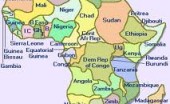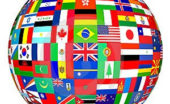Molly Minturn - My family is heartbroken to share that my father died in surgery on Monday, Feb. 10. It…
Wednesday Night #995 with Eli Blitzer
Written by Diana Thebaud Nicholson // March 28, 2001 // Reports, Wednesday Nights // Comments Off on Wednesday Night #995 with Eli Blitzer
We are so very pleased that Eli Bitzer, the South African Consul General, will be with us this week, as will our good friend Dr. John Shingler. In their company, we may return to topics more related to Africa than to our recent discussions of Latin America. By the same token, we can expect to hear from them something about the perception of globalization and Greater Trade issues among the people and governments of the Dark Continent.
We do hope that you will be able to join us this week and, in the meantime, would like to remind you that the Wednesday Night Millennium will soon be upon us – mark your calendars for May 2nd (#1000) and/or May 9 (#1001).
*******************
INTRODUCTION
No new faces gathered about the table this evening, but neither John Shingler nor Eli Bitzer had been with us for a long time and therefore they brought new perspectives on a topic which has been off the media radar for some time – South Africa. And, as they pointed out, in this case, no news is good news.
SOUTH AFRICA
The last quarter century has seen incredible changes in the realm of news reporting. Visual and descriptive images of violence and destruction capture our imagination and remain fixed in our minds, never updated, because the media shift their concentration to those areas of the world in which the riots, crimes, killings and social disorganization are current. We must look to sources beyond the media for the progress that has been made by such countries as Mexico and South Africa which no longer make the headlines, precisely because of the progress they have made. In May ’94, South Africa virtually disappeared from the news where it had been firmly anchored for nearly twenty years (since Soweto in ’76).
South Africa has undergone the transition from Apartheid in an exemplary non-violent manner, possibly due to the profound influence of Christianity (93% of the population belonged to a Church) which encouraged the white population to be contrite and the black population to be forgiving. The political transformation is complete; the Constitution includes one of the world’s finest Bill of Rights. Nelson Mandela was the successful bridge between past and present and now M’beki represents a new kind of leader – the first with an economic background – and one who is totally devoted to the fight against corruption across Africa. Crime is down, houses have been built, electricity and telephone service provided where none existed previously. To combat the serious problem of illiteracy, 40% of the national budget is devoted to education.
THE ECONOMY
Problems still exist in South Africa, including a serious AIDS problem, a debt load that is largely short-term, a disappointingly small trade surplus, a 23% unemployment rate, elevated inflation, net capital outflow and a weak Rand. On the other hand, monetary growth is under control. The face of South Africa has changed as it prepares to embrace freer trade and globalization.
AIDS
President M’Beki’s statement to the effect that AIDS was not caused by HIV was totally misinterpreted by the media. What he was saying was that AIDS is a multi-faceted problem related to poverty. However, the confrontation with the AIDS establishment has triggered a positive reaction from the major pharmaceutical companies which will gradually make new affordable drugs available to treat AIDS in Africa and other impoverished nations.
GLOBALIZATION AND SOUTH AFRICA
One issue facing the world today is the inevitability of globalization. In order to predict the future under globalization, it is useful to examine a microcosm. In the 1920’s and 30’s the South African authorities constructed huge trade barriers, with state socialization, the encouragement of import substitution, promotion of the ethnic elite, and national stagnation, only to find the country overtaken by Indonesia and other countries in Southeast Asia that embraced freer trade and exchanges. Protectionism is not a workable alternative, but there is an enormous need to humanize globalization. If it is to be totally successful, it is necessary for the poorer countries of the world to be active participants in the planning of the global structure, and for the world’s more affluent countries to accept the responsibility for debt-forgiveness and funding education for those debt-ridden countries if they are not to be forever condemned to poverty. Successful globalization implies the refusal to accept the continuing discrepancy between rich and poor.
Immigration laws and restrictions stand in the way of free market implementation. Many of the industrialized nations siphon off educated, professional immigrants which leads to a consolidation of European/North American elite, leaving the poor at home.
South Africa has taken both a leadership role and sometimes played an even more important part behind the scenes in continental cooperation and peacekeeping as a member of the G-20 nations, the Organization for African Unity (OAU) and the Africa Caribbean Pacific (APC) nations. The ultimate goal is an African Union not unlike the E.E.U. but this will not happen until more nations subscribe to the need to join in taking responsibility for Africa’s future, working towards the African Renaissance. In the meantime, it is noteworthy that the OAU has assumed responsibility for peacekeeping on the African continent and also for ostracism of dictators (e.g. Nigeria, Ivory Coast).
SHOULD WATER BE SOLD?
Newfoundland, recognizing that the responsibility for Canada’s waterways, with the exception of international waterways is a provincial responsibility, is contemplating the sale of fresh water just before it is returned to the ocean. This would be an ill-considered step for various reasons. Once commercialized, it would under NAFTA, open the door to exploitation by American corporations throughout Canada. In view of the seriously environmentally unfriendly attitudes of the Bush Government, Canada must be exceptionally careful of its resources and also consider the experiences of other countries who, in following the path advocated by Newfoundland’s Premier have found the land spoiled for all time by the back-flow of seawater. The example of the devastation of the region of the Aral Sea also serves as a caution for those who are eager to drain inland waters for irrigation purposes.
QUOTES OF THE EVENING:
“AIDS (in Africa) is like the black plague of Europe.” Visiting Southern Africa in the 21st. century – crime is down.
“The rich countries of the world cannot (continue to) hide their eyes from the plight of the poorer countries.”
“The wealth of the 200 richest people in the world is equal to the total economies of the 41 poorest nations.”
“Since the 15th May 1994 (from 1976 uprising) South Africa has not been covered (in the media) except crime corruption, incompetence”.
“Politically, the transformation is complete. (South Africa has) really … achieved (its) … political Utopia.”
“The absence of globalization is a worse threat (than globalization).”
“More than eighty-five percent of the world’s refugees are housed in the world’s poorest countries.”
“The transition that has happened in the past decade (in South Africa) is a model that should be followed in the rest of the world.”
“Technically, globalization is inevitable … The pervasive kitch is everywhere. There are some aspects of this that are extremely ugly.”
“You cannot just look at AIDS as a medical problem. You have to look at it as a multifaceted problem.”
“Time was when wars solved economic imbalance. Since the (atomic) bomb, this doesn’t work any more. The power of money is replacing the power of munitions.”
“Taking over the world is taking on the role of globalization. What we are doing is not what we are professing to do.”



